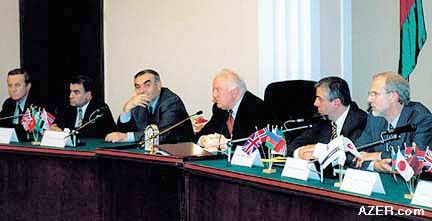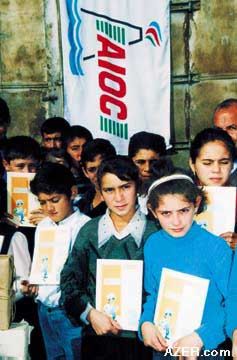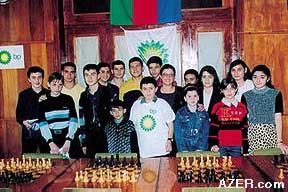|

Winter 2000 (8.4)
Pages
94-97
BP Current
Developments
by
Tamam Bayatly
Progress on
Pipeline
On October 17, 2000 the Azerbaijani Government and the State
Oil Company (SOCAR) along with the international companies who
are sponsoring the construction of the pipeline reached an agreement
to commence basic engineering of the Baku-Tbilisi-Ceyhan (BTC)
oil pipeline project. [Note that Ceyhan is the Turkish spelling
for what is pronounced as "Jeyhan" in English].
They also signed Host Government Agreements with Azerbaijan,
Georgia (October 18) and Turkey (October 19) for transit across
these countries. In Turkey, the project sponsors signed a lump
sum fixed price turnkey agreement with BOTAS [pronounced BOTASH],
of which the first phase will be basic engineering of the line
in Turkey and a Turkish Government financial and performance
guarantee. At this stage the project sponsors include: SOCAR
(50%); BP (25.41%); Unocal (7.48%); Statoil (6.37%); TPAO (5.02%);
Itochu (2.92%); Ramco (1.55%); and Delta Hess (1.25%).

Above:
The Baku-Tbilisi-Ceyhan
(BTC) signing ceremony in Ankara, Turkey on October 19, 2000.
The parties will undertake a $24-million eight-month program
involving project mobilization, basic engineering and environmental
study, together with development of owners' agreements, a preliminary
financing plan and initial marketing of ownership and throughput
capacity.
Basic engineering, the first step, will lead to a more accurate
technical and commercial definition of the project, allowing
potential owners and shippers to make future investment decisions
with increased confidence.
Basic engineering is expected to be followed by a further 12-month,
$110-million program that will include detailed engineering,
works on land preparation, environmental impact assessment and
bids.
A decision will follow regarding the 32-month land acquisition
and construction period of the BTC project. This timetable is
designed to make the BTC pipeline available in time to receive
the first oil produced by Phase 1 of the Full Field Development
of the Azeri, Chirag and deepwater Gunashli PSA, which is planned
to come onstream at the end of 2004.

Above: In Baku, the BTC Ceremony
was highlighted when BP Azerbaijan Associate President David
Woodward gave President Aliyev a Baku-Tbilisi-Ceyhan triple time
zone clock.
Phase 1 Project
Significant progress has been made in the Phase 1 project of
the Azeri, Chirag and deepwater Gunashli Full Field Development.
The shareholders and the Steering Committee made a decision late
October to move into the next phase of engineering. This marks
the beginning of the Phase 1 contracting and procurement stage.
This stage will dominate the period leading up to third quarter
next year, when the company expects the project to be sanctioned
by shareholders. The sanction will depend on a satisfactory outcome
to the Phase 1 Define stage and also on satisfactory progress
of the export pipeline commercial and project arrangements.
Phase 1 of the Azeri, Chirag and deepwater Gunashli development
will focus on the Azeri field and will allow average production
of up to 350,000 bpd (17 mtpa). It will comprise a 48-slot Drilling
and Quarters platform, plus an optional Gas Compression Platform,
a new 30-inch subsea oil pipeline to Sangachal, conversion of
the existing 24-inch subsea oil pipeline from Chirag to Sangachal
to a gas pipeline and expansion of the Sangachal terminal. Estimated
capital expenditure is $2.9 billion. Production from Phase 1
is planned to commence at the end of 2004.

Above:
The BTC
Ceremony in Tbilisi with Georgian President Shevardnadze.
Chirag Water Injection
The Chirag Water Injection Project, completed this year, included
the offshore lifting and installation of the 250-ton water injection
module and 50-ton deaerator on the Chirag-1 platform, enabling
BP to start up water injection at the end of May in order to
safeguard the productive life of the reservoir by maintaining
the field pressure. The water injection system is also designed
to enable extension of the plateau production period. The $55-million
Chirag water injection system is capable of injecting up to 220,000
barrels per day when in full operation, with an operating pressure
of 297 bar. By the end of 2000, the water injection equipment
will be utilizing four wells, with additional wells to be added
in the future as needed.
Chirag Future Development
Work on the significant infill development on Chirag has already
commenced. Through the application of Extended Reach Drilling
(ERD) technology, the project will increase Chirag recoverable
reserves by 330mmbbls. As a result of expansion and debottlenecking
of the existing oil and gas facilities on Chirag and Western
Export Route facilities, as well as drilling of ERD wells, daily
oil production will be increased to 130mbd by the end of 2001.
Through cooperation with and the completion by SOCAR of the Oil
Rocks Gas Compression expansion project, it is expected that
gas exports to SOCAR will be significantly increased. The first
stage of the Chirag Future Development is expected to cost $116
million, $21.6 million of which is being spent this year on offshore
construction and pre-planning for the drilling operations, which
will commence in 2001. Next year's drilling program includes
the drilling of three wells.
  Left: AIOC recently published "Azerbaijan
Dili", an Azeri-language textbook for third graders. Left: AIOC recently published "Azerbaijan
Dili", an Azeri-language textbook for third graders.
Continued Safety
Since the beginning of 2000, BP Azerbaijan has had an excellent
safety performance with zero DAFWCF (day away from work case
frequency). The company's highest priority is to maintain this
achievement throughout the remaining part of the year by continuously
improving safety performance in all of its operations.
Plans for 2001
The highest priority in all of BP's operations will continue
to be outstanding safety performance achievements. The company
expects to raise the average production rate from Chirag to 115,000
barrels per day. Next year's major milestones will include implementation
of the Chirag Future Development Project, sanctioning of the
Azeri, Chirag and deepwater Gunashli Phase 1 Project by the third
quarter, and commencement of the Phase 2 detailed engineering
during the fourth quarter.
SDX-3 Update
Shah Daniz partners have begun evaluation of results from the
SDX-3 appraisal well in order to agree on next steps in the development
of the world-class gas field. Drilling of the SDX-3 well in the
northern extremity of the field was completed on November 6.
The well was drilled to a total depth of 6,688 meters. This appraisal
well has added considerably to the understanding of the field
and in particular the precise location of the bulk of commercial
reserves within the field, which were proven via wells SDX-1
and SDX-2. The extraordinary drilling performance in SDX-3 has
given Shah Daniz partners confidence that the project could be
delivered economically. While partners review their options,
negotiations with Turkey on securing a gas purchase agreement
will continue.
Inam
Front-end engineering has been completed on the first Inam exploration
well (INX-1). BP is now preparing to drill the first Inam well
with the semi-submersible Dada Gorgud rig, following the latest
upgrade by the contractor. The INX-1 well is expected to be spudded
in December after completing anchoring operations. A deviated
well will be drilled to a total depth of 5,025 meters in a water
depth of 137 meters.
Oil Conferences
BP was the general sponsor for the Fourth International Baku
Mammadaliyev Conference "Petrochemistry into the 21st Century,"
held September 19-22. BP also exclusively sponsored the Fourth
International "Khazarneftgas-2000" Conference held
at the Aznipineft Institute in Baku October 10-13. These two
major international events provided a forum for discussing the
latest research on new processes and technology in oil and gas
production, as well as new technologies and materials in the
science and practice of petrochemistry.
  Left: BP sponsored the Junior Chess Team to
compete in World and European Championships. Left: BP sponsored the Junior Chess Team to
compete in World and European Championships.
Chess Team
BP sponsored Azerbaijan's 12-member junior chess team on their
trips to the European Chess Festival in Halkidiki, Greece and
the World Junior Chess Festival in Oropesa, Spain, where Zeynab
Mammadyarova won the World Championship in her age group [see
article about Zeynab in this issue]. At the European Championship
in Greece, Vugar Hashimov won a silver medal and Afag Khudaveriyeva
won a bronze.
Mugham Festival
Nearly 1,000 young mugham and folk music singers competed in
BP's Fifth Annual Children's Mugham Festival in the Rashid Behbudov
Song Theatre October 4. Most of the participants were refugee
children from Karabakh, which is now under Armenian occupation.
The region is known as the cradle of Azerbaijani mugham [traditional
modal music]. For the first time in the five-year history of
the Festival, the selection process of the festival expanded
beyond Baku to include participants from most of the refugee
camps, including the Sabirabad, Saatli, Imishli and Barda districts.
  Textbooks for Refugees Textbooks for Refugees
Left: Rashad Sadigov, 13,
won First Prize at AIOC's Fifth Mugham Festival on October 4,
2000.
At the
"Hello School" event, AIOC presented 500 refugee first-graders
with textbooks and school supplies at the beginning of a new
school year. This year AIOC also sponsored the publication of
18,000 copies of "Azerbaijan Dili" (Azerbaijan Language)
textbooks for third-graders. Nearly 17,000 copies of the textbook
were distributed to children from refugee and IDP families in
40 regions.
Refugee Poetry
Thirteen-year old Lamiya Safarova (penname: Kochkunlu, which
means "runner", the Azeri word for refugee) is a poet
from the Jabrayil district in Karabakh. BP recently published
a book of her poetry in two languages - Azeri and English. This
richly illustrated poetry holds symbolic meaning, as it communicates
the feelings of a whole generation of Azerbaijani children who
fled their native villages six to eight years ago. They were
just small children then, but they can still remember and see
every path in their gardens, every tree and flower bush in their
yards. Now these children are scattered all over the country
and forced to live in shelters, railway cars and tents with their
families. A ceremony marking the presentation of the book was
held jointly by BP, the Ministry of Youth and Sports and the
State Committee on the Problems of Refugees and IDPs. At the
event, Lamiya recited her poems and played the saz, one of Azerbaijan's
traditional musical instruments.
  Left: Young Refugee poet Lamiya Safarova
at the dedication of her first poetry book. Left: Young Refugee poet Lamiya Safarova
at the dedication of her first poetry book.
Outreach to Children
BP is supporting 150 disabled children between the ages of 7
and 16 at the Zugulba Bone Tuberculosis Sanatorium.
Forty percent of the children are from refugee and IDP families,
many of them traumatized as a result of the war in Karabakh.
The project started in October 2000 and will last until April
2001. BP support includes production and distribution of computer
training manuals, English-language textbooks, and classes in
the Internet, personal hygiene, human rights and rights of the
child, sewing, knitting, music and the arts. BP also helped establish
a children's library at the sanatorium. In addition, BP has refurbished
a children's camp in Shuvalan near Baku, equipping it with sports
facilities and equipment, arts materials, computers, musical
instruments and teaching materials.
New Safety Park
BP recently opened its third children's traffic park in Baku
in the Yasamal district. The park operates as a recreation area
and training center for raising children's road safety awareness.
To date, BP Azerbaijan's Road Safety Project has involved close
to 20,000 schoolchildren from 200 schools of Baku. The company
holds Children's Road Safety Awareness Weeks twice a year in
collaboration with the Baku City Traffic Police and the Baku
City Center for Extracurricular Activities.
  Left: BP's third Children's Traffic Park
opened in Baku School No. 295 as part of the Children's Road
Safety project. Left: BP's third Children's Traffic Park
opened in Baku School No. 295 as part of the Children's Road
Safety project.
Children's Day
BP and AIOC joined local and international organizations in marking
November 18th as Universal Children's Day. BP employees visited
orphanages in the Ramana and Mashtaga villages near Baku and
presented the children with clothing, school supplies and blankets.
BP also presented gifts and prizes to winners of a children's
sports competition organized by the Ministry of Youth and Sports.
____
From Azerbaijan
International
(8.4) Winter 2000.
© Azerbaijan International 2000. All rights reserved.
Back to Index AI 8.4 (Winter
2000)
AI Home
| Magazine Choice | Topics
| Store
| Contact
us
|